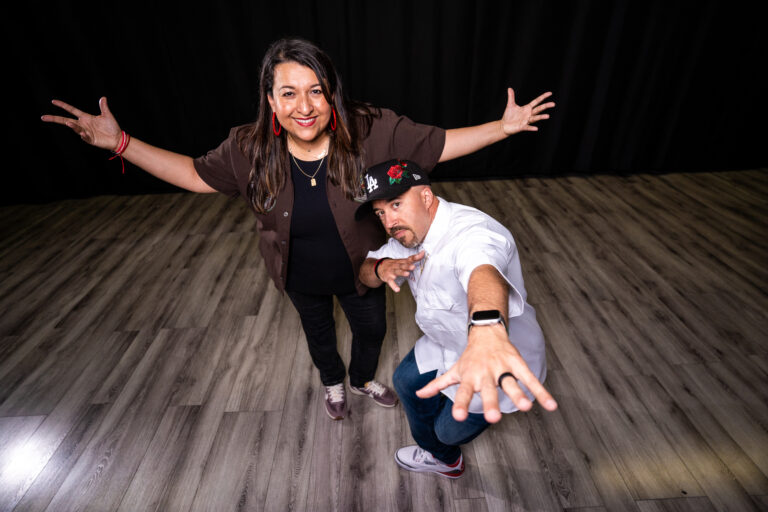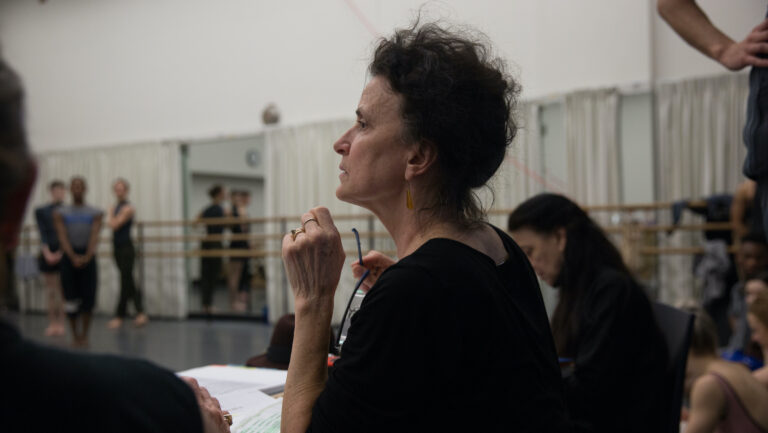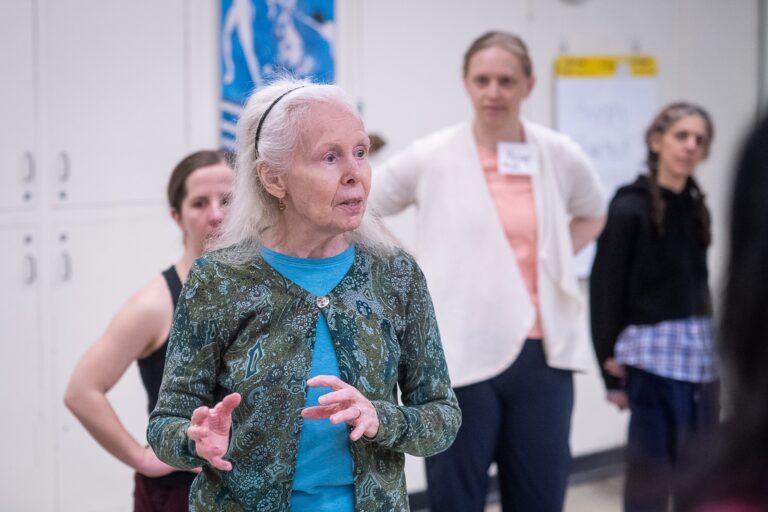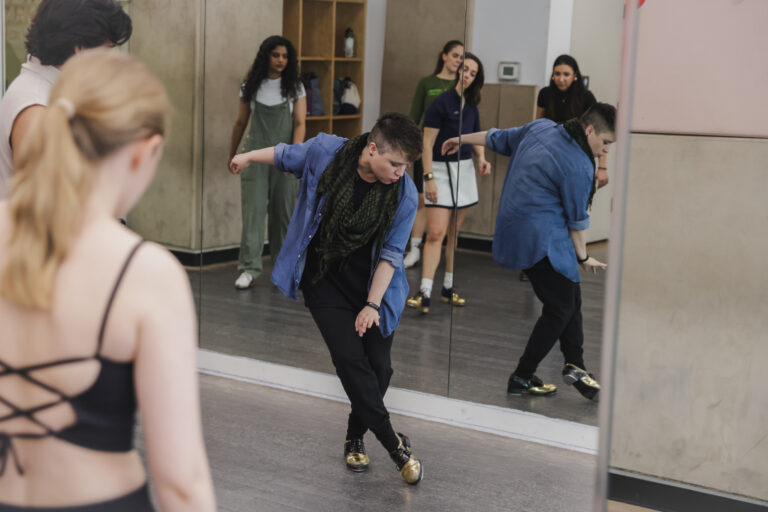
Artists are at the forefront of humanity’s possibilities. It begins in the classroom, where we arm future generations with a knowledge of history, tools for provocation and skills to cultivate their unique voices. Jawole Willa Jo Zollar has exemplified these considerations onstage and off- for over 30 years.
She founded Urban Bush Women in 1984, and has received many accolades in the years since: a designation as a Master of African American Choreography from the John F. Kennedy Center for the Performing Arts in 2005; a NY Dance and Performance Award (“Bessie”) for Walking with Pearl…Southern Diaries in 2006, followed by a Bessie for Lifetime Achievement in Dance in 2017; Guggenheim and United States Artists Fellowships; Doris Duke Artist and Dance Magazine Awards; the Arthur L. Johnson Memorial Award from Sphinx Music, presented at its inaugural conference on diversity in the arts.
Zollar’s embodied knowledge, exploration of cultural expression and distinct artistic voice demonstrates a deep listening, curiosity and fearlessness, qualities that can be found beyond the stage. Today, she acts as Urban Bush Women’s founder and visioning partner, and directs the company’s acclaimed Summer Leadership Institute, which hosts a series of anti-racist and community-leadership trainings. She is also a professor at Florida State University, where she holds the positions of the Nancy Smith Fichter Professor of Dance and Robert O. Lawton Distinguished Professor.
Zollar’s ongoing investment in her students and long-lasting commitment to equity are why Dance Teacher chose to recognize her with its 2021 Award of Distinction. She continues to shape an empowered generation of dancers, cultivating their unique “sound” while encouraging their involvement in civic engagement and organizing. Her wisdom, ingenuity and “Tell it like it is, no nonsense” approach provides fertile sediment for dancers, dancemakers and teachers alike. Dance Teacher spoke with Zollar about teaching in the time of COVID-19, embodying history in the classroom and considering an anti-racist lens in dance education and creation.

How are you feeling in your body today?
Good! I was on Zoom all day, but I’ve learned to turn off the camera, lay on the floor and stretch. I’m listening, I’m still engaged. Sitting in the chair constantly looking at a screen is so hard on your body. I’ve learned to practice a lot of self-care while I’m doing so.
What are you excited about for the coming year of teaching?
I’m teaching at Florida State. We are mandated to be in person. There is no mask requirement, and we are mandated that we cannot ask students to wear masks. There is no vaccine requirement and testing. It’s a lot of challenges, and, in spite of that, I’m looking forward to being in person. [Editor’s note: On August 9, FSU mandated masks in all campus facilities.]
Of course, you have concerns, but having taught for a year and a half on Zoom, being in person is exciting, particularly since I will have a group of sophomores whose college experience has been only on Zoom.
Tomorrow, everything could change, but this time of COVID is about adaptability. Honestly, when I get really down, I think about those ancestors whose names we don’t know who walked from the South to the North to freedom. It must’ve seemed endless. It must’ve seemed impossible. There was no way to know when and how. Just staying on the journey. That’s what keeps me going.
Speaking of adaptability, talk us through the evolution of your pedagogy and how your dance lineage supports your pedagogical journey.
There’s a thread that runs through all of it. From my primary dance teacher Mr. Stevenson to Dianne McIntyre, there is something about searching for your authentic voice.
I grew up in an all-Black community during segregation. All modes of moving were Black. That gave me certain kinds of perspectives and ways of moving and thinking that I didn’t fully appreciate when I first started studying ballet and modern. As you train, you learn, grow and bring in new information, but it doesn’t obliterate your mother tongue.
Dr. Nancy Smith Fichter was wonderful in facilitating the growth of my voice, and not trying to push it into a mode to look like other voices. Dianne was the same. She liked jazz, and that’s also the under-girding of my mother as a jazz singer and pianist. Jazz was all around me growing up. Dianne said jazz is about your sound. When you’re developing your sound, you develop your proficiency, and your sound shouldn’t sound like anybody else’s. I’ve been lucky that the people I came in contact with were really instrumental in helping me develop my sound. It might’ve been Fred Moten, in one of his lectures that said he liked the idea of finding your sound more than finding your voice because sound implies multiplicity, density and complexity.
How does this learning find its way inside of how you teach?
I want students to know and understand that whatever their sound is, they can have a long functionality in their bodies. I’m not teaching them a particular way to dance. I’m teaching principles of movement that help you find ways of knowing. I want to promote sustainability and yet I don’t want it to feel like this is the only way for you to move. I want them to have strong principles of moving so that whatever direction they go, they’ve got something to sustain them for a lifetime.
How do you stay activated inside of your teaching practice?
I’m doing yoga three times a week and conditioning with a trainer twice a week. You go through different times where you’re training your body in different ways, but through all of it, there are these principles of movement and longevity.
As long as I’ve been teaching, I’ve been studying and taking classes with different kinds of teachers. To teach means you’re in a constant state of learning. I’m a relentless seeker.
For the last year and a half, while teaching on Zoom, I didn’t do much floorwork because a lot of students were in the bedroom. I focused on a standing practice, core strength, and how it supports movement.
I also focused on dance history and lineage, because I think it’s one of the things that is changing, disappearing. I’d mention my own dance lineage, and say names like Pearl Primus, Cunningham, Limón, and I would see blank faces. I started making linkages between lineage and what I teach; embodying a history, so when you do this with me, this is actually where it comes from. You should know these names from an embodied point of view, not just reading a sentence in a book.

Why do you feel an anti-racist lens is important for teachers and students inside of dance training and performance?
Many of our assumptions are unexamined, and because they’re unexamined, we don’t realize the ways that racism has impacted these assumptions and you pass it on to the students. To really be able to consistently evaluate race, class, gender, heteronormativity is to recognize I’m seeing through a particular lens and maybe I want to choose. Anti-racism work is about looking at humanity, because racism dehumanizes, and understanding how you want to build towards humanistic practices and see the full value in people. In order to do that, we have to unpack assumptions.
I’ve been doing anti-racism work for years; it’s like dance training. It’s not about taking one workshop and either being happy or unhappy with what your experiences were. It’s about constantly doing this work, like dance.
Okay, one last question. Take us back to 1952, a little girl in Kansas City, Missouri. She’s getting ready to walk through this thing called life. She has a backpack. What is inside of her backpack?
Games, playing outside, running around. The kind of trust that the whole community has their eyes out on you. The chain of voices, like when you were being called home. “Willa Jo, ya mom was looking for you!” Lots of roaming. The ways that people dance. The women who were friends of my mother who were defining themselves and breaking rules. The intellectual curiosity that was expected of us. The armor that was given to us—this ain’t going to be easy; you need to be tough. Be ready. There’s a certain kind of passion and toughness in my backpack. My boxing gloves, lots of culture, songs, rhythms, validation of Blackness, even in the midst of all of the dehumanizing segregation. You can do anything you want, you can be anything you want, and whatever you gonna do, you do it your best. Excellence and expectation of excellence was in my backpack. When you strive and when you succeed, it’s not just because of you, it’s because of your whole community. Therefore, you need to have a constant relationship to how you support and uplift your community.
There is so much I’m grateful for in my backpack.
Update: Zollar was been named a 2021 MacArthur Fellow, colloquially known as a MacArthur “genius” grant, on September 28. The Dance Teacher team extends a heartfelt congratulations on the well-deserved honor.
Register here for the 2021 Dance Teacher Awards, taking place Wednesday, October 6, at 6 pm Eastern/3 pm Pacific. Meet the rest of the honorees here.



